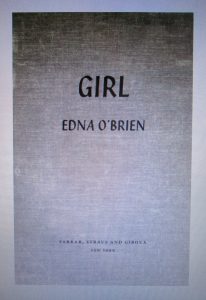Late last year, at the age of 89, famed Irish novelist, memoirist, playwright, poet, and short story writer Edna O’Brien, published her forty-fifth work, a novel titled Girl.
Girl is the fictionalized story of one Nigerian schoolgirl, whom O’Brien has named Maryam, who is among a group of other girls abducted by the Islamic militant group Boko Haram, raped, imprisoned, and enslaved. Maryam, however, ultimately manages to escape, along with her baby daughter, Babby, fathered by one of the jihadist fighters.
Maryam’s journey back to her village is relentlessly harrowing. And when she finally reaches her village, instead of being welcomed home, she and her child are treated as outcasts. (It is a wonder – and a tribute to O’Brien’s vivid imagination — that the story has a hopeful ending.)

This is a difficult book to read, I found; but it is necessary, I feel, to help understand this true-life horror story. Reading about Boko Haram in the news, it’s easy to wince and turn the page. After reading this novel, however, which brings the heartbreaking headlines to life, you cannot forget.
According to an interview with O’Brien by Sean O’Hagan in London’s The Guardian newspaper last August, O’Brien got the idea for Girl while reading a newspaper report about a girl who was found wandering in a Nigerian forest.
“Every day the newspapers are full of novels waiting to be written,” O’Brien told O’Hagan, but this small item resonated for her. “The girl had escaped her captors, but she had lost her mind and she was carrying a baby. I could not have written this novel if the violence and injustice done to this young woman and many others hadn’t been molded on to my self and my soul.”

Writes O’Hagan, “Girl is unlike any of [O’Brien’s] novels that preceded it […] the style [is] spare and restrained, the terrain unfamiliar, a world away from the landscape and discontents of her native Ireland.”
To write Girl, O’Brien, then in her late-eighties, traveled from her home in London to Nigeria twice, for extended periods, to speak with victims, doctors, aid workers and local journalists. And, through her contacts, she met the girls whose survivor’s stories she absorbed and then transformed into the novel’s single narrative told in Maryam’s voice.
In her sixty-year writing career, O’Brien has been no stranger to controversy, I learned. (Her first novel, The Country Girls [1960], was banned by the Catholic Church, for example.) And this her newest novel, it appears, may bring her more controversy, coming as it is at a time when “cultural appropriation” – the act of taking or using things from a culture that is not your own — is a highly charged topic in literary circles.
(See all the recent controversy around the new novel, American Dirt, a book about Mexican migrants that I have yet to read and therefore cannot take a fully informed stance on.)
But O’Brien has a response regarding her Girl. As she told O’Hagan, “It has been suggested to me that as an outsider I am not eligible to write this story. I do not subscribe to that devious form of censorship. Theme and territory belong to all who aspire to tell it and the only criteria is the gravity in the telling….”
In my own small experience with this form of approbrium — as a person who has lived and worked for eight-plus years on the ground in various countries in Africa and has written and published four books about my experiences in Africa and the remarkable African women and men I came to know there – I stand with O’Brien.
It’s been sad for me to find that many Americans, and not just African-Americans, don’t trust the words of an older, white, American woman (like me) when it comes to writing about Black lives. They seem to suggest: What could you possibly know? My response: I know I have stories well worth sharing, true and enlightening stories you would enjoy reading, if you’d only care to read them.
At the end of her review of Girl in the New York Times last October, Francine Prose, summed up O’Brien’s cultural appropriation issue nicely, I think:
“Let’s give O’Brien credit for her energy and passion, for reminding us that at every moment girls are being abused and exploited with unconscionable cruelty and malice. Let’s honor her for the grit that inspired her, a woman in her 80s, to travel to Nigeria to listen to people’s stories. We’re still hoping for that book by the Chibok [Nigerian] girl, but in the interim we should celebrate Edna O’Brien for the skill with which she makes us care.
“Surely it’s better to be mindful of the suffering humans inflict on one another, around the world and within our borders, than to distract ourselves with the pleasures of our comfortable lives and forget the crimes that have happened and continue to happen as we wait for the witness, the survivor, the ideally suitable person to tell us the harrowing truth.”

Right on, Bonnie — it’s usually a case not of what you do but how you do it. Everyone’s story deserves to be told but some do not have the voices to tell them.
So true, Kim! And not only HOW you do it but also WHY. (Fame? Fortune? Or empathic communication?) I could have gone off on this point, but I decided to keep this one short and sweet! 🙂 If you get a chance, please look at O’Brien’s 2:21 YouTube video on this subject. (I would have added the link, if I knew how to find the link to add.) She’s so smart and articulate.
I support O’Brien’s work – not everyone can write a tale in language that can pierce cross-cultural armor, make others care.
Well put, Carol: “pierce cross-cultural armor.” Yes, I think some people wear armor to protect themselves from the truths about the lives of others. Thank you for chiming in! — xx
Bonnie here is the link to the short interview. To copy these links, in YouTube, click on ‘Share’. The address is displayed and along side it a ‘Copy’ icon. Click on it. Go to where you want to paste it, like here for example and press ‘Paste’. And ta dum. https://youtu.be/sitEP4MZSPE
And there are bunches of other interviews with her available also. Thanks for bringing her work to our attention.
Thanks so much for supplying the link, Toni dear! (I’ll never get the hang of these steps — click on this, copy that, click on the other thing, copy here, paste there… I’m technologically hopeless, alas! 🙁 )
Hola Bonnie querida,
Thanks for the links! I will look for Girl. This is a difficult subject. I do believe we all can write about the topic of our choice but in the case of American Dirt, what annoyed many Hispanic writers was how much publicity the author received and the advance amount, much larger than what we Latinx writers usually get for telling our own stories.
Besitos
Querida Te — Yes, I’ve been following the controversy over “American Dirt,” and I empathize totally with the Hispanic writers. So unfair! (But, alas, the American business world is not known for its fairness.) We can only hope that the big-name U.S. publishers learn from this outcry and change their ways.
Oh Bonnie!
So glad this book was powerful for you as it was for me! I am an O’Brien fan and have read most of her books!
If you haven’t read her autobiography Country Girl, not the novel Country Girls, also great, then I recommend it. It’s a romp through ’60s London, Ireland and past and present!
She is a feminist hero!
Dear Shari — I’m thrilled to know you’ve read “Girl,” too, and agree. I’ll have to look into her memoir now. Thanks so much for the recommendation!
Dear Bon,
I have been reading about O’Brien’s novel. I only hear good things, though its difficult subject matter may prevent my reading it. I loved her quote saying how newspapers are full of books waiting to be written.
American Dirt is different in that I have only heard people saying, “Should we read this novel?” I hear the controversy, but it’s not from people who have read it. As I recall, I heard its author is one-eighth Latino, which some consider insufficient to entitle her to write about this subject.
I don’t believe writers or any artists should be withheld from expressing their voices on any subject that they choose to discuss. Should actors only be allowed to play characters with whom they share an ethnic background? Literature’s discourse must be open to all.
Love,
Paul
Paul, dear — My understanding (and please see my Cuban writer-friend Te Dovalpage’s comment below) is that Hispanic writers/readers resent the fact that the author of “American Dirt,” who is not Mexican (I read that one of her grandmothers is/was Cuban) received a seven-figure advance for this novel about Mexican migrants, even though she has never lived in Mexico and some of her writing doesn’t ring true. I empathize, for sure.
Michael got that criticism when he and his fellow (white) archaeologist co-wrote a book about cultural resource management among Native American tribes. The reviewer asked, “Why are these two white guys writing a book about Native cultural resources?” I edited their rebuttal and added the line, “If not us, who?” Because no one else was writing about it, and there needed to be a book that could be used in teaching about the subject at Native American colleges.
Yes, this is certainly an issue that seems to provide an outlet for a lot of pent-up emotion and anger. (Which is not to say that that anger over past and present wrongs due to racism isn’t justified.)